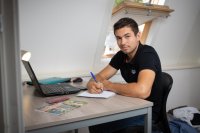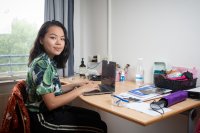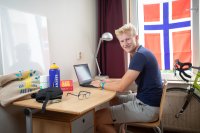Smaranda Filip.
Text Luuk Zegers photos Sven Menschel
I was looking for a degree programme in both environmental studies and agriculture
Who?
Smaranda Filip (18) from Constanța, Romania
Degree?
International Land and Water Management
‘Constanța is a city on the Black Sea. I am used to hot weather and the beach. It’s a bit different here. But I like the fact that it’s so clean here, and nice and green.’ Smaranda Filip has plenty of plans for her time in Wageningen apart from her studies. ‘I shall probably play squash or tennis. And I like languages so I want to learn Dutch.’
Filip was looking for a degree that pays attention to both the environment and agriculture. She got to know about WUR on the internet and registered for two BSc programmes. ‘I hesitated between Environmental Sciences and International Land and Water Management. In the end I picked International Land and Water Management because of the practical approach. The field trips, talking to farmers and so on. Looking at how theory translates into practice.’
Wageningen is not very well-known in Bulgaria

Who?
Petar Dundin (18), from Veliko Tarnovo, Bulgaria
Degree?
Animal Sciences
‘My family has a farm with cows, pigs, corn, wheat and more. So I wanted to study something related to our business. I Googled ‘top farmer’s university in the world’, and the first place to come up was Wageningen. So when I found out that this university was starting with Bachelor’s programmes in English, I was very happy.’
Wageningen is not well-known in Bulgaria, says Dundin. ‘The Dutch universities in the bigger cities are more popular. Nobody has really heard of Wageningen.’
In his degree in Animal Sciences, Dundin wants to concentrate on cows and pigs. ‘Nutrition, behaviour, the best way to take care of them… My favourite animal? I really love pigs.’ In his spare time, when he is not helping out on the farm, Dundin does Thai boxing. ‘And I play the kaval, a typical Bulgarian instrument. It’s a type of wooden flute. My parents will bring it with them when they come to visit me.’
I already knew I would want to do my Master’s here

Who?
Jennifer Limanau (19) from Jakarta in Indonesia
Degree?
Food Technology
‘I’m an active person. I like hiking, diving, and travelling,’ says Jennifer Limanau. She was always interested in Food Technology. ‘I already knew I wanted to do my Master’s in Wageningen but because there was no international Bachelor’s here yet, I started a Liberal Arts degree with a focus on food in Maastricht last year. When I heard that WUR would offer the international Food Technology BSc this year, I quit that programme and enrolled here.’
Limanau’s aunt lives in the Netherlands and works for Danone. ‘A lot of her colleagues come from this university, and they highly recommend it.’ After graduating she wants to go back to Indonesia. ‘There are still a lot of people living in poverty, and I want to help them.’
One big difference between Indonesia and the Netherlands is how people behave, says Limanau. ‘Dutch people are super-straightforward, while in Indonesia we make things as ‘soft’ as possible. We have a word for that: basa-basi. This means to do your best not to offend anyone. We don’t like confrontation, we are super-considerate.’
The atmosphere is different to that of French universities

Who?
Aude Prummel (18) from Lyon, France
Degree?
Soil, Water, Atmosphere
Aude Prummel is half French, half Dutch. ‘My Dutch family said I should look here because I like the natural sciences. At the open day I was enthusiastic from the start. There is quite a different atmosphere than at French universities. The university suits my personality.’
Prummel like being out in nature. ‘Lyon is near the Alps. I love hiking in the mountains.’ The Netherlands is a lot flatter of course, but that is not the only contrast with France. ‘The food culture, for instance. The cuisine is a lot simpler here.’ But the Netherlands has its advantages as well. ‘I like the way the Dutch get around by bike so much. There are great cycle paths.’
Even though she speaks fluent Dutch, she chose Soil, Water and Atmosphere because it is taught in English. ‘I want to go on to work internationally, and in France everything is in French. I wouldn’t have chosen this degree programme if it had been taught in Dutch.’
A good mix of natural and social sciences

Who?
Konrad Peckolt Fordal (21), from Trondheim in Norway
Degree?
Environmental Sciences
Konrad Peckolt Fordal, who is half Norwegian, half German, loves sport.
‘I play volleyball and handball, I bike and I love skiing. Here I will take part in a team sport, probably volleyball. It’s cool that there are so many sports here that I can try out.’
Like Wageningen, Trondheim is a university town. ‘I’m used to seeing students everywhere. They run the place in Trondheim.’
‘I wanted a nice mix of the social and the natural sciences. Not a lot of universities offer that in the way that Wageningen does. It seems to be one of the best universities in this field.’ One of the topics Fordal wants to focus on is the energy transition that is under way. ‘From fossil fuels to producing energy in a sustainable way.’
| Preliminary enrolment | Netherlands | EU | Outside the EU | % international | |
|---|---|---|---|---|---|
| Environmental Sciences | 52 | 21 | 4 | 32% | |
| Food Technology | 154 | 11 | 12 | 13% | |
| Animal Sciences | 120 | 7 | 3 | 8% | |
| International Land and Water Management | 85 | 6 | 2 | 9% | |
| Soil, Water, Atmosphere | 81 | 3 | 0 | 4% |
According to the figures on preliminary enrolment (as of 3 September ), 69 international students from 29 countries are coming to take the five new English-taught Bachelor’s degree programmes. 48 of these students come from the European Union. With 8 students, France is the best-represented country, closely followed by Germany (7) and Italy (6). The best-represented countries outside the EU are Indonesia (5) and China (3). The final enrolment figures will be published on 1 October.
